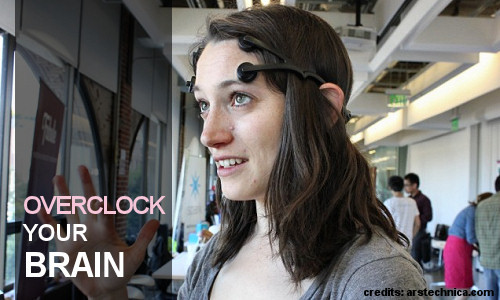After an interminable wait, the first brain-boosting tDCS headset has finally received FCC approval and will begin shipping in the next few days. Dubbed the Foc.us, the headset jolts your prefrontal cortex with electricity, improving your focus, reaction time, and ability to learn new skills. The Foc.us is being targeted at gamers looking to improve their skillz, but tDCS has the potential to improve — or more accurately to overclock — almost every aspect of your life.
To give its full name, tDCS stands for transcranial direct current stimulation. Transcranial simply means that the direct current (i.e. from a battery rather than the AC mains) is passed across a region of your brain. In the case of the Foc.us, the direct current passes between the cathode and anode, which are placed over your prefrontal cortex. Basically, by pumping electrons into your brain, your neurons, which communicate via spikes of electricity, become more excitable. This means that they can fire more quickly, improving your reaction time. Furthermore, when you remove the current, your neurons are imbued with additional neuroplasticity — in other words, they more readily make new connections, improving your ability to learn new skills.
The amount of current used is very small — on the order of two milliamps, much less than the current a 9V battery delivers — and in theory there’s very little risk. The Foc.us website says you shouldn’t use tDCS if you suffer from epilepsy, and that you shouldn’t use tDCS to treat any medical conditions.
In reality, tDCS has no known short-term risks. Early studies have shown that tDCS, which can also be used to stimulate regions of the brain other than the prefrontal cortex, such as the motor cortex, can provide therapeutic effects to people suffering from Parkinson’s, stroke patients, and more. DARPA has already used tDCS to reduce the time it takes to train new snipers, and university research groups have used it to improve the performance of gamers. In less formal settings — i.e. DIY enthusiasts — tDCS has been used to improve almost every area of cognition, or to release the brain’s most powerful opioid painkillers.
If the gains from tDCS really are as amazing as these early reports suggest, there could be some serious ethical considerations if tDCS becomes widespread. Should students be allowed to use tDCS to improve their studies or to pass exams? What about professional e-sports gamers? If one team starts using tDCS to improve their reaction time and actions per minute (APM), other teams will have no option but to start using it — unless tDCS becomes the electronic equivalent of doping and is quickly outlawed, of course.
The Foc.us headset costs $249 (£179), and is available in the US, UK, most other English-speaking countries, Russia, and the rest of continental Europe. Pre-orders are being shipped now, and new orders should be fulfilled in August. iOS users can use a free app to control the headset via Bluetooth (pictured above), while Android users are currently out of luck.
Story Source:
The above story is based on materials provided by Extremetech.com.





